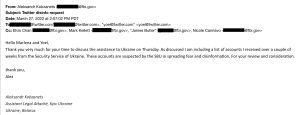Leaked emails indicate that the Federal Bureau of Investigation (FBI) has assisted a Ukrainian intelligence initiative to regulate social media users and gain access to their personal data. In March 2022, an FBI Special Agent forwarded a list of Twitter accounts to the platform on behalf of the Security Service of Ukraine (SBU), the country’s primary intelligence agency.
According to journalist Aaron Mate, the FBI stated that these accounts were suspected by the SBU of disseminating disinformation and causing fear. Accompanying the list was an SBU memo requesting Twitter to suspend certain accounts and disclose their user information.
The targets of this joint FBI and Ukrainian government initiative include members of the press, with Mate’s own name and Twitter profile being included in the SBU list provided by the FBI to Twitter.

Twitter agreed to examine the accounts for “inauthenticity” in response to the FBI, but expressed concerns about the inclusion of Mate and other “American and Canadian journalists.” The FBI’s bid to suspend Twitter accounts at the behest of Ukrainian intelligence is among the most explicit requests for censorship exposed thus far in the Twitter Files, a collection of leaked communications from the social media behemoth.
Article here: https://t.co/onb5mLXrjB
In March 2022, an FBI Special Agent sent Twitter a list of accounts on behalf of the SBU, Ukraine’s main intelligence agency. The accounts, the FBI wrote, “are suspected by the SBU in spreading fear and disinformation.” pic.twitter.com/mxwGrVNLuz
— Aaron Maté (@aaronjmate) June 7, 2023
The FBI’s censorship request was conveyed in a March 27th, 2022 email from FBI Special Agent Aleksandr Kobzanets, the Assistant Legal Attaché at the US Embassy in Kyiv, to two Twitter executives. Four other FBI associates were included in the email exchange.
The Ukrainian government’s FBI-enabled list of accounts marked for censorship extends to members of the media.
The SBU list that the FBI provided to Twitter included my name and Twitter profile, as well was several Russian journalists. pic.twitter.com/U7X9FNUYj8
— Aaron Maté (@aaronjmate) June 7, 2023
“Thank you very much for your time to discuss the assistance to Ukraine,” wrote Kobzanets. “I am including a list of accounts I received over a couple of weeks from the Security Service of Ukraine. These accounts are suspected by the SBU in spreading fear and disinformation. For your review and consideration.”
The document, composed by Ukraine’s SBU, incorporated 163 accounts, one of which was Mate’s. Despite the numbering extending to 175. The list was prefaced with: “Due to the full-scale war of the Russian Federation against Ukraine, the aggressor state uses hybrid methods of war in the form of a powerful information campaign using social media and social networks.
“In particular, several Twitter accounts have been identified that are used to disseminate disinformation and fake news to inaccurately reflect events in Ukraine, justify war crimes of the Russian authorities on the territory of the Ukrainian state in violation of international law.”
The FBI’s attempt to ban Twitter accounts at the request of Ukrainian intelligence is among the most overt requests for censorship revealed to date in the Twitter Files.
The FBI described the suppression effort as "assistance to Ukraine."
— Aaron Maté (@aaronjmate) June 7, 2023
The document finishes, “Taking into account the above, to stop Russian aggression on the information front, we kindly ask you to take urgent measures to block these Twitter accounts and provide us with user data specified during registration. We express our gratitude for the existing level of interaction.”
Out of the 163 accounts identified by the SBU, 34 have been suspended and 20 no longer exist, while the remaining accounts continue to be active. The FBI refrained from responding to Mate’s inquiries about their role in supporting the censorship initiatives of Ukrainian intelligence.
The leaked docs come from the Twitter Files, a collection of leaked communications from the social media giant. These files have raised numerous questions about the extent of cooperation between social media platforms and government agencies.

